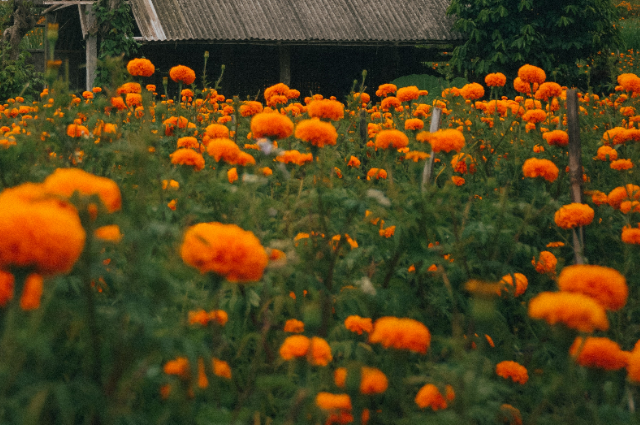
Once barren lands in Kerala are now a breathtaking visual treat for visitors to Kattakada. Thiruvananthapuram, with its vibrant hues of orange and yellow and the fragrance of freshness in the air and sprawling marigold farms, is all ready. The credit for this remarkable development goes to the ambitious project of the Kattakada Assembly Constituency near the capital.
Desolation has desolated itself to give way to a carpet of blooms.
As Onam is around the corner, the capital district may not have to depend on flowers from neighbouring Tamil Nadu or Karnataka as acres of land have here been cultivated with Kattakada.
'Our Onam, Our Flowers' was an innovative project launched by Kattakada MLA I B Satheesh and it has now been implemented successfully.
The sunshine blossoms are ready to be harvested and will be available till the end of the Onam season.
Initially, when the land was being cleared and the jungles also, they were a bit doubtful about the outcome. But fears didn't come true.
Women workers were also involved in flower cultivation. The women workforce from Kudumbashree and MGNREGA are the ones who plowed, planted, and watered the saplings to create this blooming marigold farm.
Collective action produced real fruits. The Panchayat, Agriculture Office, MGNREGA, Kudumbshree, and the government worked together to achieve this goal. It was also part of a project to convert barren lands into agricultural farms. In Pallichal Panchayat, 26 acres of land have been converted into flower farms. Private individuals have also come up to join the government initiative and cultivated flowers on their lands. It has also contributed to developing it as a tourist area. The Panchayat will hold flower markets in the city to buy flowers at a low cost. They are also supporting the flower vendors in markers. They were assisted by the government in providing them with quality saplings. A team also helps them with technical support at the farm.
Thiruvananthapuram had never thought of cultivating flowers thinking that the soil and climate may not support the crop. However, the project turned out to be a success and a model for many.
. . .
Reference:
- theprint.in
